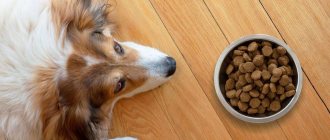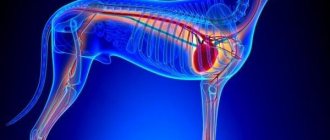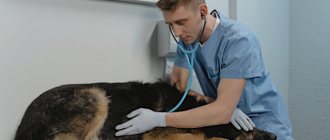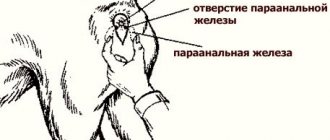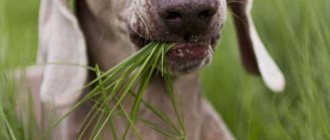Note that the yellow liquid may not only be stomach acid and bile; Your dog may have eaten something yellow and can't digest it.
There are many reasons why your dog is vomiting yellow bile. In many cases, vomiting goes away on its own and is not a cause for concern.
However, vomiting of any kind may indicate a more serious condition, especially if vomiting occurs frequently.
- Indigestion (often due to poor diet)
- Obstruction of the gastrointestinal tract
- Exposure to toxins
- Pancreatitis or other gastrointestinal inflammation
- Infection
- Biliary vomiting syndrome
- Liver disease and/or gallbladder problems
What can cause dogs to vomit?
Vomiting of bile contents can occur in isolated cases or systematically. The separated masses acquire a yellow, green tint. They consist of liquid and sometimes contain fragments of undigested food. The owner needs to carefully look at the frequency with which the animal has seizures and why dogs vomit bile.
Isolated cases
In some episodes, vomiting occurs due to eating weeds while walking. In this way, the animal rids itself of hair and other debris in the stomach. This does not affect your well-being.
It happens that a dog swallows grass, causing it to vomit. This suggests that there is an increased amount of bile in the body. In such cases, you should call a doctor. It may be necessary to prescribe choleretic drugs.
Vomiting of bile occurs if a hungry animal is given a large amount of fatty food. This also applies to service dogs who are offered fatty food after a day of work. The release of a significant amount of bile can damage the mucous membrane of the digestive organs and lead to death due to the penetration of bile into the blood.
One-time vomiting of bile is most likely the result of acute poisoning with stale food with artificial additives, pesticides or heavy metal compounds. In this case, the animal is shown to the doctor. The same actions are performed in case of heat stroke. A jump in temperature has a negative effect on the body and leads to a tragic outcome.
Finally, vomiting of bile occurs due to severe stress or a change in diet (when the animal is switched from natural food to dry food). It is especially dangerous when an animal is allowed to try sweets, cocoa products, fried meat or delicacies. They also provoke vomiting in the animal. Confectionery products cause serious poisoning in animals caused by impaired kidney function.
Recurrent vomiting
If frequent episodes of bilious vomiting are found in dogs, the reasons for this are as follows.
- Hepatitis. The animal shows aversion to food and nothing can improve the appetite. The pet's weight loss is often observed.
- Chronic forms of gastritis. With this disease, vomiting appears in the morning. The animal weakens, loses weight, and its coat condition deteriorates significantly. Gastritis also leads to a deterioration in the absorption of vitamins.
- Rejection of the contents of the gallbladder into the stomach due to disruption of its sphincter. For this reason, the development of a perforated ulcer is possible.
- Infestation with parasites. An excessively large number of worms is one of the likely causes of death in dogs.
- Presence of gastric neoplasms. With this pathology, the animal vomits undigested food debris.
- Entry of a foreign body into the stomach. Because of this, vomiting is profuse and repeated.
- Diseases of the pancreas.
- Piroplasmosis. An extremely dangerous disease when a pet can die in a matter of days. Vomiting in a dog due to the development of piroplasmosis at the terminal stage.
- Infectious pathologies: damage by leptospirosis or adenoviruses, plague, enteritis, parainfluenza, rabies. Dog owners need to remember that rabies is a fatal disease: once its earliest symptoms appear, it is impossible to cure the animal.
- In pregnant bitches, vomiting bile is the result of toxicosis.
- Chronic poisoning with pesticides, salts of heavy metals. There is a danger of toxic substances entering the blood and developing general poisoning.
- Diseases of the central nervous system.
- Systematic vomiting occurs when overeating.
- Formation of intestinal obstruction.
When food is not a joy, but a “provocateur”...
The most depressing surprises in terms of health fall on the yard Barbos, who come into contact with various animals (including stray cats and dogs) and can contract a dangerous infection.
Dogs living in apartments also often suffer from abdominal pain and nausea. Typically, vomiting exhausts dogs that are not obedient and can eat something from a garbage bag in the absence of their owners. Sometimes the owners’ overly kind and undisciplined guests play a not very good role in a puppy’s story. Such guests have a habit of treating the little shaggy handsome man with forbidden delicacies: ice cream, grilled chicken. But a pet’s stomach can simply rebel from unusual food.
The following signs will tell you that your dog is suffering from vomiting:
- The puppy is acting restless.
- The animal can hear rumbling in its stomach.
- A large amount of saliva is released from the dog's mouth.
- The pet is suffering from belching.
Having guessed that the dog will soon vomit, try to take your pet to some quiet corner of the apartment, where there is no expensive furniture or carpets. When the dog starts vomiting, stay near it, and a little later offer the dog clean, cool water. The color of your pet's vomit should be examined. Streaks of blood or a large amount of mucus in dog vomit are a dangerous signal.
Symptoms of vomiting
Nausea occurs before the release of intestinal contents. The main sign is that the dog constantly licks its face. When a dog is nauseous, he salivates and refuses to drink water. Periodically, the animal belches loudly, and when auscultated, a rumbling sound is detected in the stomach.
Vomiting of bile in a dog is combined with such symptoms.
- Constant intermittent vomiting. Then an admixture of bile is detected in the vomit.
- Excess of gastric contents in the morning or at night. The animal refuses to eat.
- When a dog vomits, it whines or howls in pain.
- The animal often tenses, its gaze is directed at one point. Due to the specific posture and movements during nausea, it seems that he is about to vomit.
- The dog is developing signs of exhaustion. His weight decreases, his eyes become sunken, his mucous membranes turn pale.
And also vomiting bile is combined with an unpleasant odor from the mouth. One of the diseases in which the mouth stinks strongly (the smell resembles ammonia or urine) is kidney failure. With diseases of the gums, teeth, and stomatitis, a putrid odor is felt.
If the liver is damaged, the dog does not eat anything and regurgitates. Older animals develop liver failure, cholecystitis, and jaundice.
Why does a dog vomit bile?
Such vomiting occurs when food entering the stomach causes irritation of the mucous membrane. What triggers the gag reflex? This reaction is possible in such cases.
- Animals eating grass.
- Consumption of low-quality food if it contains components of artificial origin. The same applies to cases of consumption of expired food.
- Prolonged fasting.
- Poisoning.
- Stomach ulcer.
- Liver damage.
- Weakening of the body.
- Infestation with parasites.
How to give first aid
If you find bile impurities in the vomit, monitor the dog’s condition. If, after an occasional episode of vomiting, the dog feels well and asks to go for a walk, then do not worry, but continue to monitor the condition of the four-legged dog.
If it becomes noticeable that your dog has no appetite or has lost its playfulness, then show the animal to a doctor. Before visiting the veterinarian, you can give your dog Smecta. With piroplasmosis and gastritis, a person cannot help an animal on his own: the veterinarian prescribes special medications that are taken according to a strict regimen. If the dog refuses to eat, there is no need to force feed him.
The animal is injected intramuscularly with No-shpu or Cerucal. They eliminate the urge to vomit. At this stage, give your pet only water. To prevent the development of dehydration, solutions of Regidron or Hydrolyte are prepared. They need to be given in small portions.
Monitor the animal's body temperature. It should be between 37.5 and 39 degrees. When vomiting is accompanied by diarrhea, give the dog Enterosgel.
When you need to see a doctor urgently
If vomiting bile does not go away within three days, you should contact your veterinarian. This should also be done if the following alarming symptoms appear:
- the animal hides from the light and avoids noise (this is one of the signs of distemper);
- an admixture of blood appears in the vomit;
- the dog is lethargic and is constantly in the same place;
- symptoms of dehydration appeared;
- The dog started having convulsions and shortness of breath.
How you can help at home
In the absence of new attacks and maintaining good health, it is enough to limit yourself to a starvation diet. Leave your pet without food for half a day, making sure to provide enough water. At the end of the fast, check your reaction to a sugar cube. If nausea does not return, continue feeding as usual.
In case of repeated attacks, it is better to entrust treatment to a veterinarian. Prior to examination, avoid feeding and replace water with ice cubes. Do not try to stop nausea with antiemetic drugs: they can blur the symptoms or worsen the patient's condition. To alleviate the condition, you can give your pet activated carbon or Enterosgel, which absorbs toxins.
If a visit to the clinic is not possible in the near future, try to prevent dehydration on your own. Prepare an isotonic solution by mixing water with salt and sugar, and feed it to the animal until you receive medical help. Intravenous Ringer's solution or 5% glucose solution are also suitable.
After removing a tick from your pet, drop everything and go for an examination, even if you are outside the city limits. If treatment is late, the dog’s chance of recovery is reduced to 5%.
Diagnostic features
You can determine the cause of vomiting with bile in a dog using the following diagnostic measures.
- Determination of parasites in feces.
- Blood collection and testing.
- The veterinarian will prescribe a urine test for the animal to determine the functioning of the kidneys and possible abnormalities in the functioning of other organs.
- Biochemical analysis allows you to assess the condition of internal organs. He will give an accurate answer to the question of whether there is a violation of the liver and pancreas.
- X-ray of the abdominal organs makes it possible to determine the presence of foreign objects in the stomach and intestines. An x-ray is done with a barium mixture: it allows you to detect possible intestinal volvulus or obstruction.
- PCR diagnoses infection of the gastrointestinal tract.
- Ultrasound examination of the abdominal organs is necessary to assess the condition of the stomach, liver, and kidneys.
Emergency help at home
Depending on the cause of vomiting and the age of the dog, the dog is kept hungry for some time (maximum - a day). Then the food is resumed: the dog should be fed frequently and in small portions. If vomiting does not appear within three to four days, then the pet is transferred to everyday food.
Treatment
In case of intense vomiting, symptomatic treatment is carried out until test results are obtained. It is aimed at stopping the evacuation of stomach contents to the outside, restoring normal water balance and strengthening the body. Antiperistalsis must be suppressed urgently, otherwise the dog will die from dehydration and starvation. For this purpose, taking Metoclopramide (Cerucal) subcutaneously is indicated. Tablets are ineffective in this case.
Restoring lost fluid when a dog vomits is done by drip. Electrolyte solutions are introduced in the same way.
You can ensure the normal functioning of the body by:
- No-shpy and Papaverina;
- Sulfocamphocaine (for heart support);
- Vikasol (to stop bleeding);
- vitamin products;
- medications to restore the balance of intestinal microorganisms.
Usually the animal tolerates treatment well. It is carried out as long as the doctor prescribed. In some diseases it is long lasting. Its recovery depends on how to treat your four-legged pet.
What medications can be used?
Vomiting does not stop, diarrhea begins, yellow foam appears, or the dog is vomiting bile, how to treat it? Preparations from a regular human pharmacy will do. You can safely follow the doses indicated in the attached instructions (large dogs - adult doses, medium - for teenagers, small - like for small children).
It is important to remember that antipyretics can harm your dog and should be used as a last resort.
Otherwise, the following medications will be required:
- no-shpa,
- diphenhydramine,
- papaverine.
They will relieve spasms and relieve pain.
Will help with intoxication:
- smecta,
- enterosgel,
- absorbent carbon.
Metoclopromide and cerucal normalize peristalsis. Contrical will calm the pancreas. Omeprazide, omeprazole, omez calm the gastrointestinal tract and counteract vomiting. The herbs of chamomile, St. John's wort, and wormwood are used according to the instructions. They often help cure the animal.
Drinking and eating regime
Do not try to get rid of vomiting: it helps the animal remove toxic substances. Vomiting is also a signal that a disease is developing in the body. When vomiting, the pet is provided with a comfortable position.
It is extremely important to ensure that the animal has water: due to the removal of stomach contents, the concentration of fluid in the tissues decreases, which contributes to dehydration. The dog should be given decoctions of medicinal plants.
The peculiarities of the starvation diet are that the four-legged animal is not fed for the first day, but is given water. And the next day it is allowed to include broth and food for weakened dogs in the diet. Herbal decoctions are allowed to be given by force. Normal nutrition is then resumed. If the condition improves after vomiting, the animal is offered boiled chicken, eggs, or steamed fish.
Why are they looking for grass?
Dogs cause their owners a lot of anxiety when they start feasting on street grass. After all, after such a “meal” the puppy begins to vomit. You may be surprised, but the dog specifically seeks out grass to cleanse its stomach through vomiting. This happens when a large amount of gas accumulates in the stomach of a four-legged pet, and the puppy wants to get rid of the unbearable feeling. Excessive consumption of fatty foods from the master's table can also cause discomfort in the dog's stomach.
Prevention
To prevent diseases that lead to vomiting bile in a dog, you should:
- provide the animal with high-quality feed or natural food without preservatives and antibiotics;
- follow a diet, avoid overfeeding and prolonged fasting;
- always provide the animal with access to clean drinking water and prevent dehydration;
- make sure that the dog does not eat foreign objects;
- protect your pet’s access to toxic substances;
- vaccinate the animal, remove worms from its body;
- If necessary, carry out medical examination of the dog.
Modern diagnostics make it possible to timely detect serious pathology and begin treatment.
Vomiting in dogs can be natural and associated with pathological processes in the body. When sick, the dog often refuses food, becomes exhausted, and his stool changes. This vomiting lasts for a long time and aggravates the pet’s health condition. First aid for natural vomiting is to take antipyretic and antispasmodic drugs. The dog must be provided with constant access to clean water. As soon as vomiting occurs, you should stop feeding for a while.
Preventive measures
Most diseases occur due to improper care, feeding and training of the dog. In order not to provoke vomiting, it is important to follow recommendations from puppyhood that will keep your beloved pets healthy:
- Do not allow picking up foreign objects on the street or rummaging through garbage heaps. The commands “Fu” and “No” should become law for the pet;
- carry out deworming in a timely manner;
- Vaccination is an important preventive measure against severe infections. It must begin from early puppyhood;
- owners must carefully ensure that the animal does not swallow a foreign object and do not give sharp bones;
- feed the dog only fresh food or dry food that is appropriate for its age;
- When walking, put a muzzle on a large dog. This accessory will help prevent the ingestion of toxic or spoiled substances.
